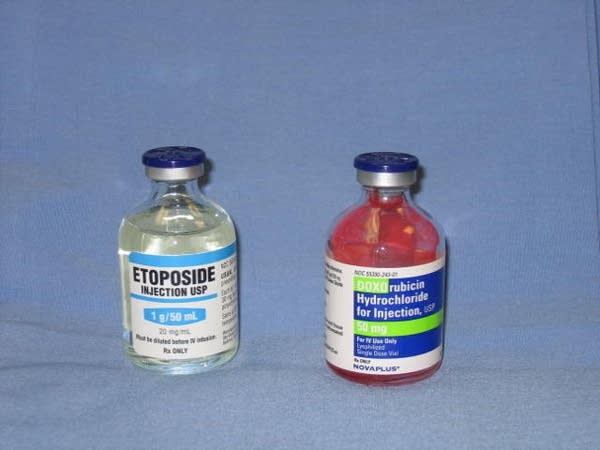Doctors, pharmacists scrambling for chemo drugs

In recent weeks, Jeanie Murray has spent hours on the phone with distributors searching for chemotherapy drugs.
It's nerve-wracking work but Murray, a full-time pharmacy buyer for United Hospital in St. Paul, knows there are cancer patients who must get their next dose on time.
When she finds two of them -- etoposide and doxorubicin -- she cautiously clutches the hard-to-find chemotherapy drugs.
"You can't start a person on therapy and four weeks later tell them you don't have enough to continue their therapy," Murray said. "So we try and borrow within the system or put in a lot of backorders."
Create a More Connected Minnesota
MPR News is your trusted resource for the news you need. With your support, MPR News brings accessible, courageous journalism and authentic conversation to everyone - free of paywalls and barriers. Your gift makes a difference.
Most cancer patients are not aware of it yet, but some chemotherapy drugs are in very short supply. Behind the scenes, doctors and pharmacists have been scrambling for weeks to collect enough doses of several commonly-used chemotherapy drugs.
Periodic drug shortages in the United States are common, but they have reportedly gotten worse in the past few years. Usually, doctors can switch patients to an alternative medication during a shortage. But that's not so easy to do when you're fighting cancer.
The chemotherapy shortage is the most recent to raise concern in United Hospital's pharmacy. Director Lisa Gersema said there have been numerous other shortages involving sedation drugs, antibiotics and diuretics to treat acute heart failure.
"This is a very serious situation and one in which we've had to devote so many more resources to than we have in years past," Gersema said. "Our management team meets actually every morning, just to go through and to see what the newest shortages are and how we need to address that. And that wasn't something that we did just even two years ago."
The reasons for the drug shortages are varied. In some cases, manufacturers can't find enough raw product to meet the rising demand for their drugs. In other cases regulatory issues, such as a failed inspection, delay the manufacturing process.

A recent wave of pharmaceutical company mergers and subsequent belt-tightening also slashed the industry's drug-making capacity -- particularly for older, generic drugs.
"They don't have a big profit margin, I'm sure," said Dr. Edward Greeno, medical director at the Masonic Cancer Clinic at the University of Minnesota. "They're small manufacturers making them. So they're often not the things that are being made by the huge pharma companies."
So far, Greeno hasn't been forced to switch any of his cancer patients to different drugs. But he has come close.
"It's tight enough," he said, "that there are days where at 6 o'clock at night we're talking about 'are we going to be able to treat these patients tomorrow?' "
As hard as it is to find some chemo drugs in the Twin Cities, it's even worse in parts of outstate Minnesota.
Hibbing resident Dana Anderson takes the drug Doxorubicin to treat non-Hodgkin lymphoma. The 59-year-old was scheduled to receive her next dose at her hometown clinic. But a few days before the appointment she got an unexpected call from her nurse.
"She said, 'Oh guess what? You have to make different arrangements because there's a shortage of this drug and we don't have any up here.' " Anderson said. "And it's like what?"
When Anderson got that call, she was in the Twin Cities waiting for an appointment with a cancer specialist at the U of M. That specialist quickly scrambled to arrange a last-minute chemo session at the university late that afternoon, before Anderson's four-hour journey home to Hibbing.
"I have one [chemotherapy session] next Wednesday up here," Anderson said from Hibbing. "I'm hoping that they'll have some [doxorubicin] by then. Otherwise I don't know exactly how it's going to work."
Many cancer doctors have tried to insulate their patients from the drug shortage situation, figuring that they're dealing with enough already.
But Greeno worries that if doctors don't speak up about the problem, the shortage could become unmanageable.
"I think if it gets worse, we are going to hit that tipping point where, all of a sudden, several drugs at once are gone completely from the market and we find ourselves in a position where really I do have a patient in front of me that I can't do what needs to be done, because I just can't get the drug I need," he said.
For now, doctors have avoided that worst-case scenario by reserving the limited chemo drugs they have for their patients who can't be treated with other types of chemotherapy. But they worry about how far they can push this strategy and whether it could reduce the chances of treatment success among some of their other cancer patients.
National organizations representing pharmacists and cancer doctors have been meeting with government regulators and the pharmaceutical industry. They hope to identify the primary reasons for the shortages and develop a plan to fix the problem.
